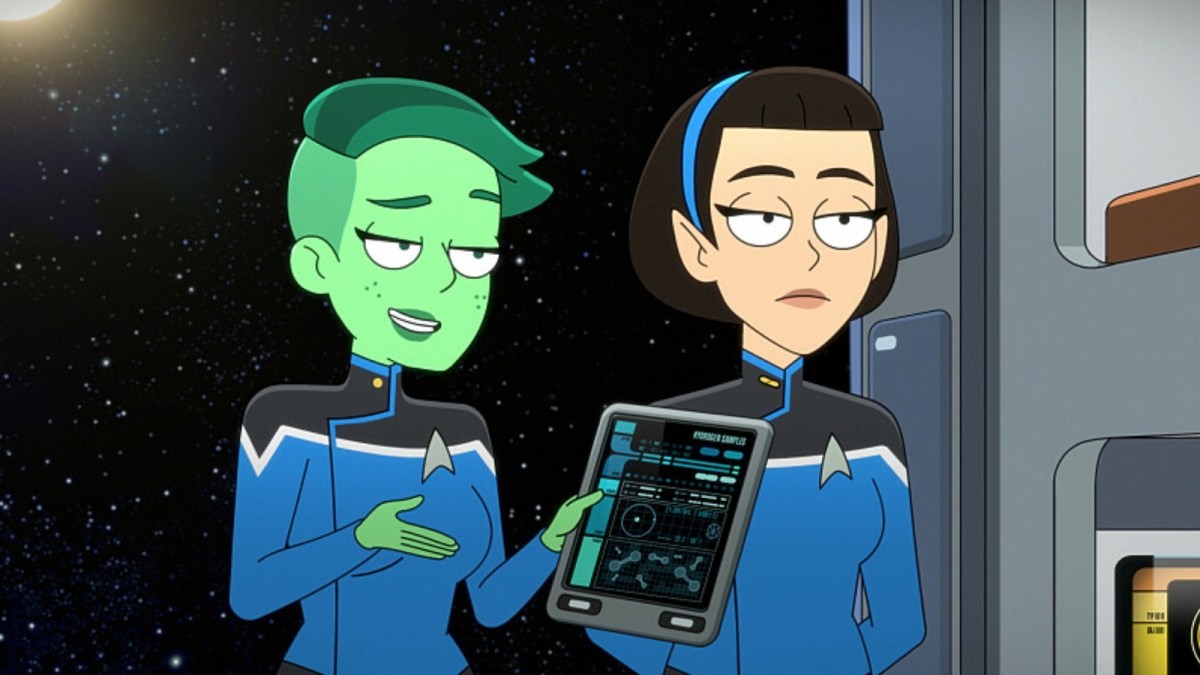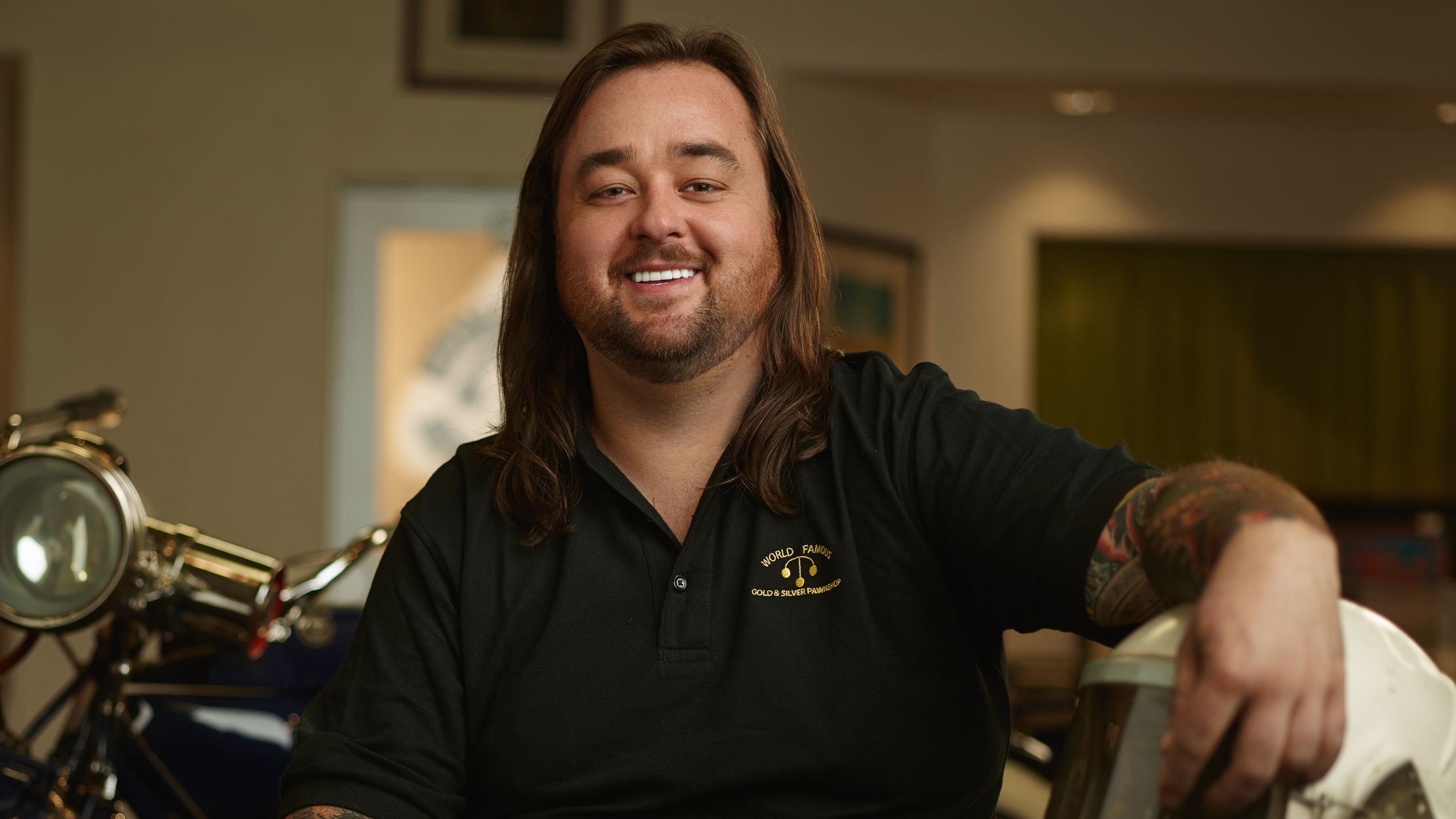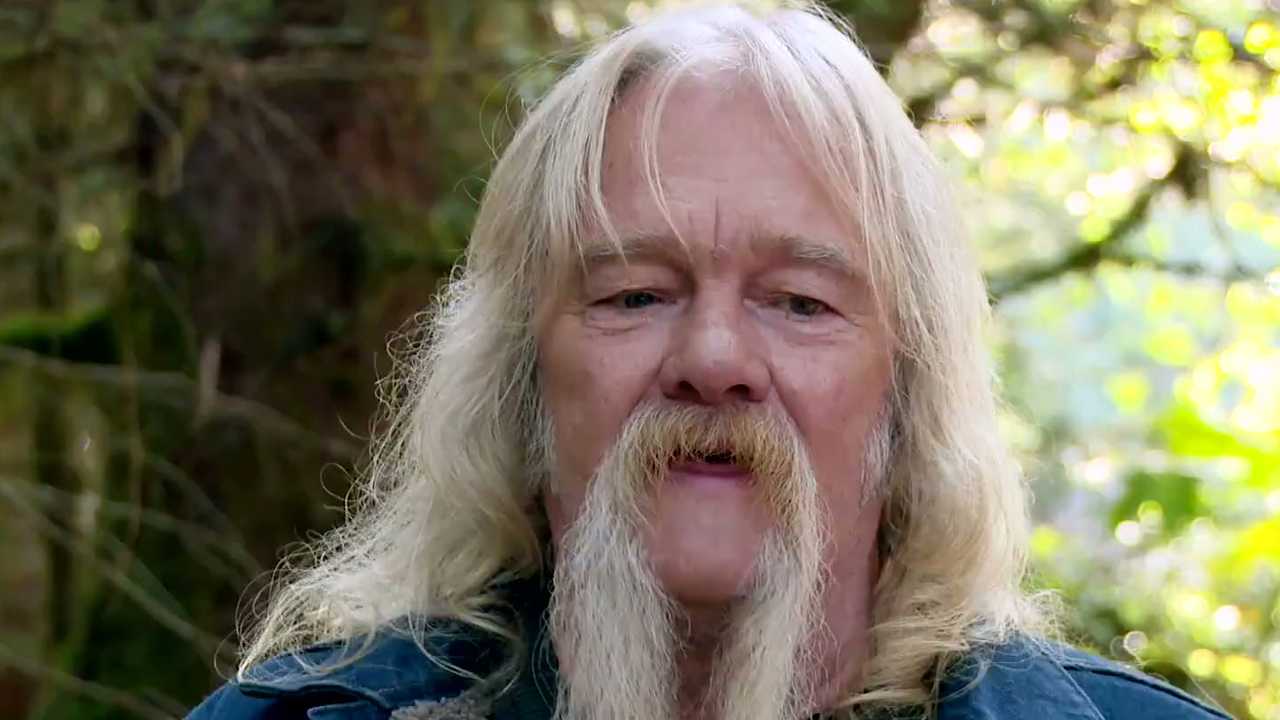This discussion of T’Lyn’s role in Star Trek: Lower Decks containers spoilers for Season 4, Episode 5, “Empathological Fallacies,” streaming now on Paramount+.
If there is a problem with the fourth season of Star Trek: Lower Decks, it is the character of T’Lyn (Gabrielle Ruiz).
T’Lyn was introduced in the second season episode, “wej Duj.” An off-format adventure focusing on the lower decks of a Klingon and a Vulcan ship, “wej Duj” was immediately praised as “the best episode the show has ever done” and went on to pick up a Hugo Award nomination. It was a moment that signaled the maturity of Lower Decks, announcing that it was a Star Trek show to be taken seriously. It was similar to what “The Measure of a Man” did for Star Trek: The Next Generation.
Unsurprisingly, “wej Duj” has become a touchstone for Lower Decks. The fourth season’s big arc is largely built around extended riffs on the premise of “wej Duj.” So far this season, the audience has cut away (or cut in on) lower decks crewmembers on the IKS Che’Ta’ in “Twovix,” a Romulan vessel in “I Have No Bones Yet I Must Flee,” and an Orion supply ship in “Something Borrowed, Something Green.” The fourth season is very aware of the importance of “wej Duj” to Lower Decks.
Related: Lower Decks Stumbles Into Some ‘Empathological Fallacies’
It is also reflected in the addition of T’Lyn to the core cast. Joining the Cerritos at the end of “The Stars at Night,” T’Lyn has appeared in every episode of the fourth season to date with the exception of “I Have No Bones Yet I Must Flee.” She is part of the core ensemble, working with Tendi (Noël Wells) to solve the crisis in “Twovix,” advising Boimler (Jack Quaid) on his first command in “In the Cradle of Vexilon,” and traveling to Orion with Tendi in “Something Borrowed, Something Green.”
T’Lyn was created by writer Kathryn Lyn, who scripted both “wej Duj” and the Star Trek: Strange New Worlds crossover episode “Those Old Scientists.” According to Lower Decks creator Mike McMahan, “T’Lyn is the name of the Vulcan she has cosplayed as for years at conventions.” Fan response to T’Lyn was enthusiastic. Almost as soon as “wej Duj” had broadcast, McMahan was promising fans, “You will see T’Lyn again.” McMahan vowed to take the show “to T’Lyn town.”
“She’s in a lot of Season 4,” McMahan explained in pre-release press. “Because of the way these seasons are written, we can’t really respond to fan feedback that quickly. I knew that I liked T’Lyn and I wanted to bring her back. But we didn’t want to bring her back right away. So when everyone freaked out about T’Lyn [in 2021] I was like ‘oh good!’ At that point, fans wanted her now, and I wanted to hold off. I wanted to tell more stories before she came in and kind of changed all the dynamics.”
The extended lead time in animation meant that the scripts for the third season were already planned out by the time that the audience met T’Lyn. Given the enthusiastic response, the fourth season was the earliest possible opportunity to introduce the character into the show. Indeed, there is a lot to be excited about, particularly given McMahan’s promise that T’Lyn’s arrival “kind of changed all the dynamics.” It is always good to keep things fresh and exciting.
T’Lyn’s arrival on Lower Decks fits in the larger context of Star Trek history. It fits particularly comfortably in the context of the Berman era, which is an obvious touchstone for Lower Decks. Those shows tended to undergo cast changes during their fourth seasons. Wesley Crusher (Wil Wheaton) was written out of The Next Generation during its fourth season. Kes (Jennifer Lien) departed Star Trek: Voyager at the same point in its run. The casts were shaken up.
However, there was also a tendency to add new actors to the ensemble. Worf (Michael Dorn) joined the Star Trek: Deep Space Nine cast in its fourth season premiere, “The Way of the Warrior.” Seven of Nine (Jeri Ryan) arrived on Voyager at the start of its fourth season. These additions radically shifted the dynamics on these shows. There is a solid argument to be made that Seven of Nine is the most enduring legacy of Voyager, even reappearing as a regular cast member on Star Trek: Picard.
Related: In ‘Something Borrowed, Something Green,’ Lower Decks Visits Orion
With that in mind, what is so surprising about the addition of T’Lyn to Lower Decks is that it hasn’t really changed anything. Indeed, T’Lyn is very much a supporting character. Gabrielle Ruiz has not been added to the show’s primary cast, but is instead credited as a guest star. She appeared in three of the season’s first four episodes, but as a supporting character. “Empathological Fallacies” is the first episode of the season to focus on T’Lyn as a lead, and the season is already at its midpoint.
This may be deliberate. The arrivals of Worf on Deep Space Nine and Seven of Nine on Voyager were controversial. They tended to get a lot of focus, particularly in the episodes immediately following their debut. Jamahl Epsicokhan observed that “focus [had] been shifted away from Kira” (Nana Visitor) after Worf’s arrival. Voyager actor Robert Beltran talked about how “the focus changed” after Seven of Nine joined the crew. Critics came to refer to Voyager as “the Seven of Nine show.”
Of course, it was possible to make these additions work. Seven of Nine might have dominated Voyager to the detriment of supporting characters like Chakotay (Beltran), Kim (Garrett Wang), and Tuvok (Tim Russ), but Worf integrated quite smoothly into Deep Space Nine. The decision to delay an episode focusing on T’Lyn until the middle of the season might be well-intentioned, but it also means that the audience has no real idea about who T’Lyn is and how she fits into this dynamic.
This gets the second issue around how Lower Decks has integrated T’Lyn. Worf and Seven of Nine added a great deal of dramatic conflict to Deep Space Nine and Voyager, and so made those shows more compelling to watch. In “Hippocratic Oath,” Worf clashed with the station’s security chief, Constable Odo (René Auberjonois) about how to deal with Quark (Armin Shimerman). In “Sons of Mogh,” he clashed with Sisko (Avery Brooks) about how to deal with his brother, Kurn (Tony Todd).
Seven of Nine frequently clashed with Kathryn Janeway (Kate Mulgrew), a relationship that came to define Voyager. In “The Gift,” she longed to return to the Borg Collective. In “The Raven,” she kidnapped Tuvok and stole a shuttle when triggered by a Borg homing buoy. In “Prey,” she disobeyed Janeway’s direct orders and released a wounded member of Species 8472 to a pack of Hirogen hunters. In the fourth season finale, “Hope and Fear,” she railed against a seeming shortcut home.
These characters added drama to the ensemble, refreshing dynamics that could become stale after three seasons with an established cast. In the early seasons of Lower Decks, there was often conflict between the series leads, particularly involving Beckett Mariner (Tawny Newsome). Mariner clashed with Boimler, her mother Captain Freeman (Dawnn Lewis), and the executive officer Commander Ransom (Jerry O’Connell). Over the following seasons, those conflicts mellowed and cooled.
This is a good thing. Mariner has grown and developed as a character. Her arc over the fourth season is learning to be comfortable with her promotion, and to accept that the greatest obstacle to her advancement is herself. Those familiar conflicts between Mariner and her co-workers could easily become repetitive or frustrating, a sign of a show stuck in a creative rut. Moving past them is a smart creative choice, even if it removes one of the show’s central driving engines of conflict.
In this sense, T’Lyn feels like something of a wasted opportunity. After all, a stoic Vulcan is a logical foil to the madcap antics of the central cast. It doesn’t need to be adversarial or confrontational, but T’Lyn offers the production team the chance to see this cast through fresh eyes. One of the best aspects of the third season was the willingness to consider outside perspectives on Starfleet, such as rogue archaeologist Petra Aberdeen (Georgia King) in “Reflections” or Ornara in “Trusted Sources.”
Of course, Lower Decks is a sitcom, not a drama like Deep Space Nine or Voyager. So one might argue that it doesn’t need character conflict. However, comedy also thrives on conflict. As Richard A. Blum advised aspiring screenwriters, “An often overlooked but essential ingredient of both drama and comedy series is internal conflict.” According to sitcom consultant Scott Sedita, “As comedy comes from pain, the Three Pillars of Comedy are derived from conflict, desperation and the unpredictable.”
Related: Lower Decks Upgrades a Classic Star Trek Narrative in “In the Cradle of Vexilon”
Many of the best and most enduring sitcoms are built around character conflict between the ensemble: The Odd Couple, All in the Family, Taxi, Veep and so on. Even many of the most enduring sitcom romances, such as Sam (Ted Danson) and Diane (Shelley Long) on Cheers, are built around a push-pull dynamic. As such, there’s a valid argument to be made for using the addition of T’Lyn to shake up the show’s central dynamics, presenting a character who challenges the status quo.
After all, T’Lyn is not a Starfleet officer. Like Aberdeen during the third season or like Kira and Odo on Deep Space Nine, she should have a different set of values. Lower Decks has hinted at this, with her disagreement with Tendi over how to deal with the “big Tuvix-y meatball” in Lower Decks, but that conflict resolved itself without even a raised voice. It’s frustrating. T’Lyn is a new character thrown into an existing cast, and Lower Decks has done little to distinguish her from the ensemble.
It’s particularly frustrating because it gives performer Gabrielle Ruiz very little to do. Ruiz is a charismatic talent, as demonstrated by her tenure on Crazy Ex-Girlfriend. However, it is very hard to play a Vulcan, as Strange New Worlds explored in “Charades.” There are arguably only a handful of actors who have pulled it off across the franchise’s history: Leonard Nimoy, Mark Lenard, Tim Russ, Gary Graham, and Zachary Quinto.
The key to playing a Vulcan isn’t to play an emotionless robot, it’s to play the emotion simmering beneath the surface. However, an actor needs to be given the proper material to play. Lower Decks frequently asks Ruiz to recite exposition in monotone, with no hint of any internal life. That’s fine for a guest character, but a player in a larger ensemble needs to be given more. As much as Tuvok was underserved on Voyager, the show could still give Russ episodes like “Meld” or “Gravity.”
T’Lyn is a fascinating character and Ruiz is a wonderful actor. It’s a shame that Lower Decks is using neither to their full potential.






Published: Oct 3, 2023 01:08 pm